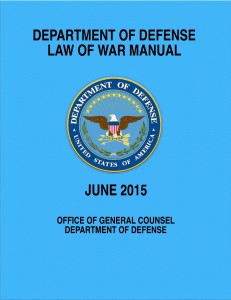June 29, 2015
I’m reading the new Law Of War Manual so you don’t have to
by Liam O'Brien
When is it okay to kill a journalist? If you want the answer, you’re going to have to work for it.
One problem with important literature is that it’s long and often boring. And while Proust, Dostoyevsky, and their ilk continue to snag devoted followers, plenty of arguably more important literature remains unread by almost everyone, despite it actually affecting them every day. I’m talking, of course, about the literature of the federal government.
When Melville House published The Senate Intelligence Committee Report on Torture last year, we were careful to remind readers that what we were publishing was the official summary of the larger, still-classified report 6,000 page report. Even so, as John Oliver was helpful to point out, it poses a challenge to most readers to actually sit down and read an important federal document of any size, let alone one riddled with redactions and containing some of the darkest subject matter imaginable.
The US tax code has metastasized to over 74,000 pages. The Affordable Care Act is between 1,000 and 33,000 pages long, depending on who you ask. And while nobody expects your average citizen with an internet connection to wade through all these, perhaps that’s the point. The growth of bureaucracy effectively inhibits inquiry, and a higher page count discourages a primary reading of documents, despite (and perhaps due to) their having immediate and far-reaching impact.
Citizens often outsource their reading to the fourth estate, though the lens of the media only focuses so much. The news cycle’s attentiveness is subject to viewer indifference and boredom more so than ever before, and big government documents are very hard to market—more so than almost any book.
Which is why you may have missed the news that earlier this month, when the Department of Defense announced that they were publishing an extremely important book.
Pentagon officials today released the Defense Department’s first law of war manual, culminating a multiyear, combined effort to compile legal principles governing warfare.
“DoD’s new manual provides a comprehensive and up-to-date treatment of the law of war for the practical use of operational lawyers and others at headquarters and in the field,” said DoD General Counsel Stephen W. Preston.
“It reflects the U.S. military’s longstanding commitment to the rule of law and represents an important milestone in our ongoing implementation of the law of war,” he said.
The announcement also pointed out that this is the first department-wide military rule of law manual; each of the military services had previously published their own.
The manual clocks in at 1200 pages, and you aren’t going to read it unless you’re a military lawyer with a real devotion to the job, or have literally nothing else to read. Yet this manual, which has been in the works for years, comes at a pivotal moment in American military history, especially in regards to military law.
The senate has just voted overwhelmingly against torture. Well, technically, they voted in favor of restricting federal agencies’ interrogation practices to the guidelines laid out by the Army Field Manual, cementing one of President Obama’s first-term executive orders into a law that would continue once he left office. And while it’s debatable exactly how far this measure will go to eliminate torture (because have you read all 384 pages of the Army Field Manual? Of course you haven’t!), the debate over what constitutes the abuse of human rights during wartime is back in the news, and still being debated on a national stage.
Which makes the content of this now-official rulebook that much more important. And not just to the small portion of American citizens who serve in the military; this type of military policy is hugely influential over our global presence, and it represents our collective national character for better or worse.
Which is why I, a lay person who mostly reads fiction and, like most of you, has zero law, military, or government experience, plan to read the entire 1200-page manual and report back on what I find, as a recurring installment for MobyLives. I’m not the first to do this; The media has already focused on how the new manual treats drone warfare (hint: positively), its introduction of the phrase “unprivileged belligerents” as a shiny new replacement for the Bush-era “enemy combatant”, and perhaps most importantly, the leeway defined for the armed services when it comes to killing foreign journalists.
And I don’t pretend to be anywhere near qualified to provide a legal or historical analysis of this document, and neither are the majority of people whose lives are affected, in ways large and subtle, by this document. Instead, I would instead hope that by reading this book and bringing you along for the ride, I can slightly reduce our collective reluctance to directly engage with widely available political documents. That, and stand by the courage of my convictions when I say that this may be the most important book released the summer.
Tune in next week for the next installment!
Liam O'Brien is the Sales & Marketing Manager at Melville House, and a former bookseller.
